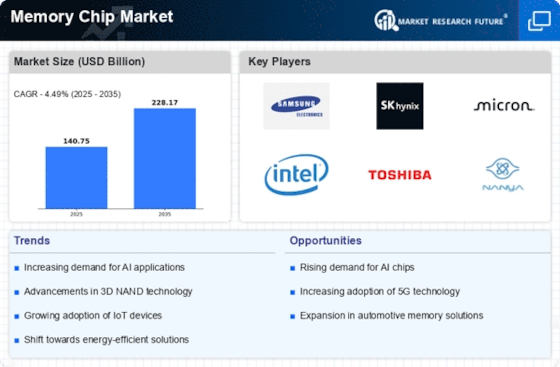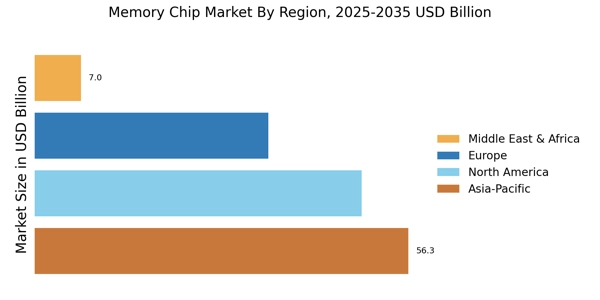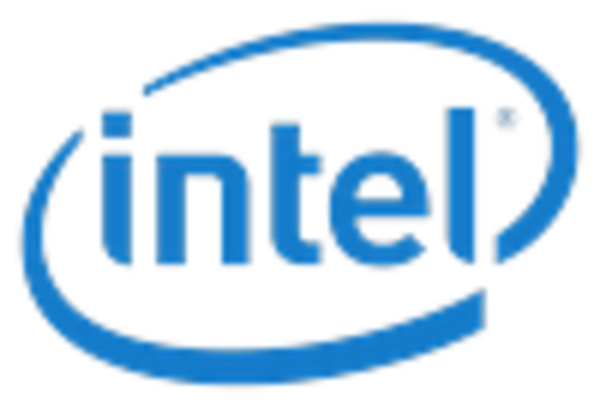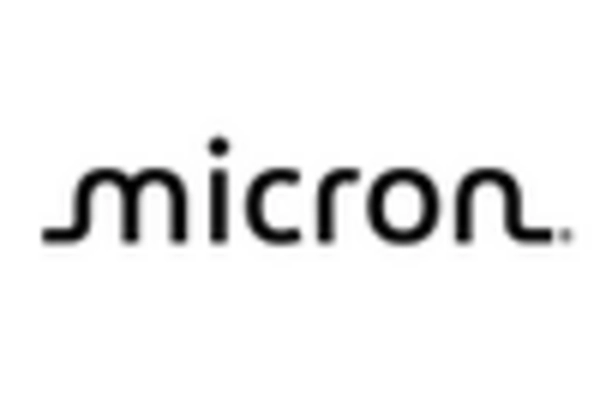Emergence of 5G Technology
The rollout of 5G technology is poised to have a profound impact on the Memory Chip Market. With the advent of 5G, there is an increasing demand for memory chips that can support higher data transfer rates and improved connectivity. In 2025, it is anticipated that the telecommunications sector will account for around 20% of the memory chip market. This shift is driven by the need for enhanced performance in mobile devices, IoT applications, and smart city infrastructure. As 5G networks become more widespread, the Memory Chip Market is likely to see a surge in demand for memory solutions that can handle the increased data load and provide seamless connectivity. Manufacturers are thus encouraged to innovate and develop memory technologies that align with the requirements of 5G.
Advancements in Automotive Technology
The Memory Chip Market is witnessing a notable transformation due to advancements in automotive technology. The integration of memory chips in vehicles is becoming increasingly prevalent, particularly with the rise of electric vehicles (EVs) and autonomous driving systems. In 2025, the automotive sector is projected to contribute approximately 15% to the memory chip market. This growth is attributed to the need for sophisticated memory solutions that support advanced driver-assistance systems (ADAS), infotainment systems, and vehicle-to-everything (V2X) communication. As automotive manufacturers strive to enhance safety and connectivity features, the demand for high-performance memory chips is expected to escalate. The Memory Chip Market must adapt to these trends by developing specialized memory solutions tailored for the automotive sector.
Rising Focus on Artificial Intelligence
The Memory Chip Market is increasingly influenced by the rising focus on artificial intelligence (AI) applications. AI technologies require substantial computational power and memory capacity to process large datasets efficiently. In 2025, it is estimated that AI-related applications will account for approximately 10% of the memory chip market. This growth is driven by the integration of AI in various sectors, including healthcare, finance, and manufacturing. As organizations seek to leverage AI for improved decision-making and operational efficiency, the demand for high-performance memory chips is expected to rise. Consequently, the Memory Chip Market must respond to this trend by developing memory solutions that cater to the specific needs of AI applications, ensuring optimal performance and reliability.
Growth of Data Centers and Cloud Computing
The Memory Chip Market is significantly influenced by the expansion of data centers and the increasing adoption of cloud computing services. As organizations migrate to cloud-based solutions, the need for high-performance memory chips becomes paramount. In 2025, it is estimated that the data center segment will represent around 30% of the overall memory chip market. This growth is driven by the necessity for efficient data processing and storage solutions, which rely heavily on advanced memory technologies. Additionally, the rise of big data analytics and the Internet of Things (IoT) further amplify the demand for memory chips, as these applications require robust memory capabilities to handle vast amounts of data. Consequently, the Memory Chip Market is poised for substantial growth as it adapts to these evolving technological landscapes.
Increasing Demand for Consumer Electronics
The Memory Chip Market is experiencing a surge in demand driven by the proliferation of consumer electronics. Devices such as smartphones, tablets, and laptops require advanced memory solutions to enhance performance and user experience. In 2025, the demand for memory chips in consumer electronics is projected to account for approximately 45% of the total market share. This trend is likely to continue as technological advancements lead to the development of more sophisticated devices. Furthermore, the integration of high-capacity memory chips in emerging technologies, such as augmented reality and virtual reality, is expected to further fuel this demand. As consumers increasingly seek devices with enhanced capabilities, manufacturers in the Memory Chip Market are compelled to innovate and expand their product offerings.

















